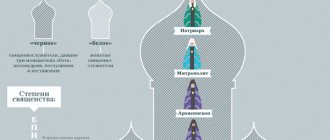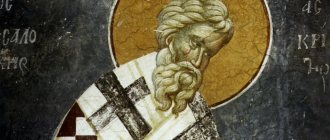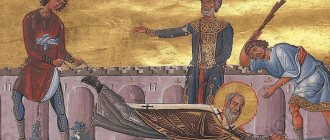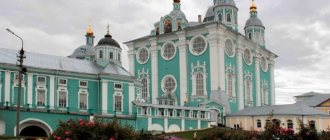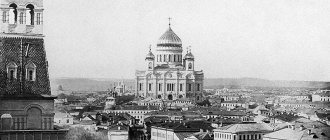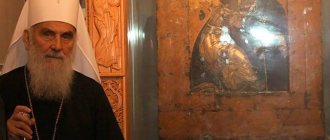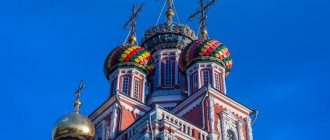The Pan-Orthodox Council is not an Ecumenical Council
The last Pan-Orthodox Council was held on the island of Crete from June 17 to June 26, 2016. It should be noted that the General Council of Orthodox Churches has not been held since the VII Ecumenical Council of 787.
The fact is that it is not possible to gather representatives of all local churches at Councils that have pan-Orthodox status. This is due to the existing disagreements in the Christian world.
"Holy and Great Council". Official logo. It was necessary to convene a Pan-Orthodox Council in order to resolve the disagreements that had accumulated in the Orthodox world
It should be noted that the Pan-Orthodox Council is an Ecumenical Council. The Ecumenical Council is a meeting of the predominantly episcopate of the Christian Church. They pass in its universal completeness.
Doctrinal (dogmatic), church-political and judicial-disciplinary issues are resolved at them. The Pan-Orthodox Council is a Council of all mutually recognized autocephalous Churches prepared by the Orthodox Church.
The era of Ecumenical Councils ended after the V Council of Constantinople.
The era of Ecumenical Councils ended after the V Council of Constantinople was held in the form of a series of meetings in 1341 - 1351. After this, the Orthodox Church did not hold Councils in its entirety.
Sometimes regional Councils of primates and delegates from two to four autocephalous were held. The very concept of a “Pan-Orthodox Council” did not exist.
Seven Ecumenical Councils, with the Creation of the World and the Council of the Twelve Apostles (19th century icon). The history of Orthodoxy knows Ecumenical Councils, but does not yet know Pan-Orthodox Councils
Attempts to hold the Eighth Ecumenical Council of the Orthodox Church were made in the 1920s, 1960s and 1990s. They were not successful. At the same time, it must be remembered that the traditions of the Orthodox Church speak of recognition of the Ecumenical Council only by a subsequent council.
That is why, if it is convened, it is expected that the Ecumenical Council of Constantinople of 879-880 will be recognized as the Ecumenical Council, which prohibited adding to the Creed and recognized the 7th Council as Ecumenical.
History of preparations for the Pan-Orthodox Council in Crete
The proposal to convene an Ecumenical Council within the Orthodox Church was put forward by the Patriarchate of Constantinople back in the late 1860s. The reason for this was the Bulgarian schism, but the Russian government rejected the very idea of this. Subsequently, similar attempts were made in 1923, 1930, 1961, 2008 and 2009.
Sutansky firman on the establishment of the Bulgarian Exarchate. In connection with the Greek-Bulgarian schism (schism) and the provision of a firman for the establishment of the Bulgarian Exarchate by the Turkish Sultan in the late 1860s, Constantinople put forward a proposal to convene a Pan-Orthodox Council
As internal church issues were resolved and communication was established between representatives of different local churches, their positions became closer. That is why, at the end of May 2010, the Patriarch of Constantinople made a joint decision with the Patriarch of Moscow and All Rus' Kirill to speed up the process of convening the Holy and Great Council of the Orthodox Church.
The first proposal to convene an Ecumenical Council after a long break was made back in the 1860s.
Four years later, as the first honorable Orthodox priest, the Patriarch of Constantinople invited the primates of the Orthodox churches to meet in March 2014.
The purpose of the meeting was to discuss the activities of the preparatory committee of the Pan-Orthodox Council, as well as to resolve emerging issues of church life. As a result, the meeting took place on March 6-9, 2014. It was attended by representatives of 13 Local Orthodox Churches.
Places of Local Orthodox Churches in the Diptych, that is, in the generally recognized list of Local Orthodox Churches. The issue of Diptychs was brought up at the 2015 Pre-Conciliar Pan-Orthodox Conference
At the meeting, a decision was made to create a special Inter-Orthodox commission consisting of one bishop and one adviser from each autocephalous Church. Her task was to accept documents adopted in the pre-conciliar process and edit them.
It was also decided to convene a Pre-Conciliar Pan-Orthodox Conference in the first half of 2015. Its goal is to discuss two topics in the Pan-Orthodox Council: “Autocephaly in the Orthodox Church and the procedure for its proclamation” and “Diptychs”.
The next stage in convening the Pan-Orthodox Council was the convening of the Pre-Conciliar Conference of Heads of Churches
The Inter-Orthodox Preparatory Commission began working in September 2014. A pan-Orthodox pre-conciliar meeting is scheduled for the first half of 2015. The meeting decided to approve the following topics for submission to the Holy Council for the purpose of making a decision:
- mission of the Orthodox Church in the modern world;
- Orthodox diaspora;
- autonomy and the method of its declaration;
- sacrament of marriage, obstacle to marriage;
- the meaning of fasting and its observance today;
- relations of the Orthodox Church with the rest of the Christian world.
Coat of arms of the Bulgarian Orthodox Church.
On June 3, 2016, the Office of the Holy Synod of the Bulgarian Orthodox Church announced that the Bulgarian Orthodox Church refuses to participate in the Pan-Orthodox Council . Despite the fact that in January 2016 the Patriarchate of Antioch refused to sign a document on participation in the Council, Constantinople announced that participation in It was decided to accept all Orthodox churches.
On June 3, 2016, Patriarch Kirill of Moscow and All Rus', at a meeting of the Synod of the Russian Orthodox Church, proposed convening a Pre-Conciliar meeting no later than June 10. On June 3, the Office of the Holy Synod of the Bulgarian Orthodox Church confirmed that the Bulgarian Church will not take part in the Pan-Orthodox Council.
This event was one of the first that led to the fact that many representatives of local churches did not recognize the Council in Crete.
Will the current situation lead to a split?
- The refusal of several Orthodox churches to participate in the Pan-Orthodox Council cannot lead to a schism. The latter presupposes the absence of liturgical communion, when Orthodox churches do not recognize the power of each other's sacraments and can perform rituals only in their own churches.
- According to Hieromonk of the Russian Orthodox Church Macarius (Markish), clergyman of the Ivanovo-Voznesensk diocese, “the differences between the churches are already very significant, first of all, this is, of course, a calendar issue.” “One church celebrates Christmas on December 25, the other on January 7, however, we do not call it a schism. We perform liturgies together and serve,” he gave an example.
Many local churches did not take part in the Cretan Council due to disagreements that arose
On June 6, 2016, an emergency meeting of the Holy Synod of the Ecumenical Patriarchate was held with the participation of all bishops staying in Constantinople. He refused to even discuss the proposals of the local Churches submitted to him, pointing out that the Synod does not have the authority to revise the already planned conciliar process.
On June 9 and 10, the Serbian Church and the Georgian Church refused to participate in the Council in Crete, with the latter citing dogmatic and other errors in the text of the decision proposed by Constantinople.
Meeting of the Holy Synod of the Russian Orthodox Church. In June 2016, at its emergency meeting, the Holy Synod decided not to participate in the Cretan Council
On June 13, 2016, an emergency meeting of the Holy Synod of the Russian Church took place. It was decided that the Russian Orthodox Church would not participate in the Cretan Council. In addition, the Russian Orthodox Church also appealed to the Patriarch of Constantinople with a request to postpone the date of the council.
Also, due to disagreements that arose between the autocephalous Orthodox Churches, which were not resolved on time in June 2016, the Bulgarian, Antiochian, Georgian and Russian Churches made the final decision to refuse to participate in this Council.
Why did Phanar refuse to postpone the Council?
- According to the decision of the Synod of the Patriarchate of Constantinople, none of the Orthodox churches can influence the process of preparing the Council.
- Associate Professor of St. Petersburg University Deacon Vladimir Vasilik expressed his assumptions about the possible real reasons for the refusal to reschedule to TASS. “With donkey stubbornness, the bureaucrats of the Patriarchate of Constantinople arrogantly despise their brothers and do not want to change anything. In this way they go against the fullness of the Orthodox Church, in this way they show that they want to establish the dictatorship of the Patriarchate of Constantinople,” he said.
Despite the refusal of several local Churches to participate in it, the Council in Crete still took place
Despite the fact that the main local autocephalous Churches declared their non-participation in the Cretan Council, the Patriarch of Constantinople refused to deviate from the planned schedule. That is why on June 16 the Council finally opened its work.
Since he worked with an incomplete staff, the heads of many autocephalous Orthodox churches declared that he had lost the grounds to be considered “Pan-Orthodox.”
Kolmivari, Greece. The 2016 Christian (Pan-Orthodox) Council, which was moved from Istanbul, took place here
Initially, it was planned to hold a Pan-Orthodox Council under the leadership of Patriarch Bartholomew of Constantinople in the Church of St. Irene in Istanbul. Unfortunately, in January 2016, Russian-Turkish relations worsened and, at the insistence of the Moscow Patriarchate, it was moved to the island of Crete.
This happened because the island is under the jurisdiction of the Patriarchate of Constantinople and the semi-autonomous Cretan Orthodox Church operates here.
The Cretan Cathedral opened on June 20, 2016.
The Cathedral officially opened on June 20, 2016. It was assumed that it would follow the example of the Ecumenical Council and thus become the first meeting of representatives of the Orthodox Churches in the last thousand years.
It was attended by 24 bishops from local Churches, and all decisions of the Council were made subject to the achievement of consensus between the Churches. Each local Church had only one vote.
The first working day of the Cathedral of Christ. It was presided over by the Patriarch of Constantinople, surrounded by representatives of other Orthodox churches.
Despite the fact that the Patriarch of Constantinople presided over the Pan-Orthodox Council as “first among equals,” he was surrounded by representatives of other Orthodox churches.
The official languages of the meeting were: Greek, Russian, French and English. In addition, Arabic was also used as a working language. The working sessions of the Council themselves took place in the town of Kolymvari, at the Orthodox Academy of Crete.
Ukrainian question of unification of schismatics
On the eve of the Pan-Orthodox Council, or rather, on the eve of it, on June 16, 2016, the Ukrainian Verkhovna Rada addressed a petition to the Ecumenical Patriarch Bartholomew I for help in uniting the Ukrainian Orthodox churches. She asked that they be granted autocephaly. Thus, in their own words, the historical injustice will be corrected, when in 1868 the Kiev Metropolis transferred from Constantinople to the subordination of Moscow. Which, according to the Rada, led to the religious annexation of Ukraine.
The Patriarchate of Constantinople recognized the Pan-Orthodox Council as having taken place
Representatives of the Patriarchate of Constantinople announced that the Pan-Orthodox Council in Cyprus took place. At the same time, even during its work, its plenipotentiary representative, Archbishop Job (Gecha) of Telmis, told media representatives that the decisions taken at it would become binding for all Orthodox Churches.
In addition, on November 18, 2016, Patriarch Bartholomew of Constantinople sent a letter to the Archbishop of Athens with a request to admonish some representatives of the Greek Orthodox clergy who reject the “Holy and Great Council.
In it, he announced that he reserved the right to sever ecclesiastical and eucharistic communion with these clergy if the Greek ecclesiastical authorities decided not to act on the request of the patriarch to punish them.
Patriarch Bartholomew I. 270th Archbishop of Constantinople - New Rome and Ecumenical Patriarch. The Patriarch of Constantinople stated that he reserves the right to sever ecclesiastical and eucharistic communion with those Greek clergy who refused to recognize the decisions of the Cretan Council
Representatives of local Churches signed the following documents following the work of the Cretan Council:
- Message of the Holy and Great Council of the Orthodox Church: To the Orthodox people and every person of good will.
- District message.
- The importance of fasting and its observance today.
- Relations of the Orthodox Church with the rest of the Christian world.
- Autonomy and the method of its declaration.
- Orthodox diaspora.
- The sacrament of marriage and obstacles to it.
- The mission of the Orthodox Church in the modern world.
4 metropolitans and 1 bishop did not sign the decision of the Cretan Council.
It is worth noting that the metropolitans did not fully or partially sign the documents of the Council of July 16, 2016:
- Athanasius of Limassol (Nikolau);
- Morphian Neophyte (Masouras) (Cypriot Orthodox Church);
- Hierotheos of Nafpaktos (Vlachos) (Hellenic Orthodox Church);
- Montenegrin-Primorsky Amfilohiy (Radovic);
- Bishop of Bac Irinej (Bulović) (Serbian Orthodox Church).
Metropolitan Athanasius of Limassol (Nicolaou).
Father Athanasius is one of those metropolitans who did not recognize the decisions of the Crete Council. The decisions of the Council also contain a final message, according to which it is proposed to “establish the Holy and Great Council as a regularly functioning institution.” The official website of the Council and its press office operate on the official portal of the Church of Constantinople: press office. Here you can study the documents adopted by him, as well as read news about the preparation of the next Pan-Orthodox Council.
New in blogs
There I was afraid of fear, where there was no fear (Ps. 13:5).
The topic of the upcoming Pan-Orthodox Council in 2016 is currently perhaps the most discussed among both the laity and clergy of the Russian Orthodox Church[1]:
– Is it true that this will be the same 8th Ecumenical Council about which there are pre-apocalyptic rumors?
– Is it true that after 2016 it will no longer be possible to go to churches of the Russian Orthodox Church?
There were serious concerns that the Pan-Orthodox Council being prepared by the Patriarchate of Constantinople would have to legitimize at the highest level the line of secular-liberal reformation of Orthodoxy, its transformation into the so-called. secularized “Euro-Orthodoxy”, but in essence – a betrayal of it. The opportunity to carry out such a grandiose revolution in the Orthodox Church exists both due to the presence of an active secularized modern flock and clergy , which gives rise to complete indifference to the truth and reluctance to live by it and defend it, and because of external pressure on the hierarchy of Local Churches from International Centers development of world democracy[2].
Recently, fake documents about the upcoming Pan-Orthodox Council have begun to spread, designed to instill fear in other zealots beyond reason, who blindly trusted these documents and replicated them online. This refers to a certain secret “International Memorandum on the Creation of a New World Religion” [3], signed in Strasbourg on June 25–29, 2014, which supposedly comes into force on May 1, 2016, i.e. simultaneously with the convening of the Pan-Orthodox Council on the initiative of Patriarch Bartholomew of Constantinople.[4] The nonsense of this “Memorandum” is not even worthy of serious disassembly. It is enough just to point out that among the signatories of this fictitious “Memorandum” there is also the signature of “the representative of the Slavic Patriarchates and the Russian Government, Archbishop Hilarion of Volokolamsk (Russia)” (sic in the original. – Note by N.K.). Although Metropolitan Hilarion (Alfeev) actively participates in various ecumenical events, it is still impossible to imagine that he could put his signature on such an absurd anti-Christian and anti-Russian document. Naturally, neither Patriarch Kirill nor the head of the Government of the Russian Federation D.A. Medvedev would have given Bishop Hilarion such a shameful authority to sign nonsense documents. And Vladyka Hilarion himself is not a stupid person to expose himself in such a way. It is obvious that this horror story about the creation of a new world religion at the Pan-Orthodox Council of 2016 was specially compiled by enemies of the Church and timed to coincide with the Council of 2016 with the aim of discrediting the defenders of traditional Orthodoxy.
The current geopolitical moment should also be taken into account, when the enemies of Russia right now need to weaken the spiritual power of the Russian Church and its authority among the people by any means possible.
However, it seems that the concern of Orthodox believers with the decisions of this upcoming Pan-Orthodox Council reached the hierarchy of all local Orthodox Churches and played a positive role.
So what do we end up with?
1. The 2016 Pan-Orthodox Council will take place not in Turkish Istanbul, but on the Greek island of Crete.
The reason for the transfer of the Pan-Orthodox Council from Istanbul to Crete is the Russian-Turkish crisis and the insistence of Patriarch Kirill on the issue of moving the Council from Istanbul to another place: the presence of the delegation of the Russian Orthodox Church in Istanbul is currently impossible due to Turkey’s hostile policy towards Russia. In fact, Patriarch Kirill pushed through the transfer of the Council from Istanbul. Against the background of the severe crisis in Russian-Turkish relations, the upcoming Pan-Orthodox Council represents an excellent geopolitical chance for Turkish President Recep Tayyip Erdogan to “annoy” the Kremlin and all of Russia in the person of the Russian Orthodox Church. As you know, Patriarch Bartholomew of Constantinople is a Turkish subject. Erdogan will be able to put pressure on Turkish citizen Bartholomew in order to push through at the Pan-Orthodox Council interpretations of the Council’s points that are unacceptable for the Russian Church (and therefore for Russia). With the transfer of the venue of the Pan-Orthodox Council from Turkish Istanbul to the territory of Greece, the possibility of pressure by the Turkish president on the adoption of conciliar decisions has now been greatly reduced.
2. The calendar issue was removed from the agenda.
Also, as a result of the persistence of His Holiness Patriarch Kirill and the delegation of the Russian Orthodox Church, the draft document “Calendar Question” was excluded from the topics of the upcoming Pan-Orthodox Council. Patriarch Kirill at the Pre-Council meeting in Chambesy is completely irrelevant for the Orthodox Church and can only sow confusion among many believers .
Patriarch Kirill told reporters that the topic of the transition of all Orthodox Churches to a single calendar will not be on the agenda of the upcoming Pan-Orthodox Council in June. The Russian Orthodox Church does not intend to abandon the use of the Julian calendar and switch to a new style (Gregorian calendar).
“It is very important that the calendar issue was removed . He greatly disturbed our believers, because incorrect rumors were spread that everyone would definitely have to switch to the new style,” Patriarch Kirill told reporters.
He recalled that many Churches adhere to the Julian calendar, and some adhere to the Gregorian calendar, “and in order to leave each Church the opportunity to act in accordance with the accepted calendar, it was decided that the calendar issue would not be considered at the Council.”
3. Publicity of the topics discussed at the Ecumenical Council.
Patriarch Kirill said that all documents that were agreed upon by the heads of the Orthodox Churches and that will have to be discussed at the Council will be published in the near future. The Primate of the Russian Church emphasized the importance of publishing draft conciliar documents and overcoming the lack of reliable information, which arouses suspicion among many believers :
“Our Church insisted that there should be no embargo on these documents, but that people could familiarize themselves, because many critical views on the upcoming Council were formed precisely because of the information vacuum. People knew nothing about the Council. And, probably, the most important thing is that everyone will know what issues and how will be resolved at the Council, what documents will be used as the basis for the decisions of the Council,” explained the Primate of the Russian Church.
* * *
And so, as a result of the persistence of Patriarch Kirill, on January 28, draft documents that will be discussed at the Council in June 2016 were published on the official website of the Russian Orthodox Church. All believers of our Church can now familiarize themselves with the drafts of these documents.
Thus, having familiarized itself with the draft document “The importance of fasting and its observance today”, adopted by the V Pan-Orthodox pre-conciliar meeting in Chambesy (October 10-17, 2015), which will be proposed for consideration by the Pan-Orthodox Council in 2016, the editors of the “Blessed Fire” website state that There are no anti-canonical innovations in this project that could cause concern among Orthodox believers . There is not a word in this draft about revising the practice of fasting on Wednesday and Friday, as was indicated in the paragraph of the official summary of the Pre-Conciliar meeting in Chambesy: Η Νηστεία. Πρέπει να αλλά weditude κανόνες της νηστείας της τετάρτης και παρασκευής.
The agenda of the upcoming Pan-Orthodox Council remains the topic of ecumenism (“The relationship of the Orthodox Church with the rest of the Christian world”), which causes legitimate concern for a huge number of Orthodox believers who do not want the patristic faith to mutate into some kind of “syncretistic Orthodoxy.” But the text of this draft, upon careful reading, does not contain any union, much less super-ecumenical provisions, which many believers feared. The usual sluggish bureaucratic ecumenism, as in recent decades, i.e. WCC – only for DECR.
Let us hope that the delegation of the Russian Church, headed by Patriarch Kirill, will show ecclesiastical integrity and steadfastness in this matter and will not agree to any changes to the Tradition of the Orthodox Church.
* * *
Patriarch Kirill arrived in Chambesy and so masterfully settled everything in the interests of the Russian Orthodox Church and the Russian state that not a single Greek patriarch or metropolitan dared to say anything. Everything that at the upcoming Pan-Orthodox Council could pose any danger to the integrity of the Russian Orthodox Church and the stability of the Russian state was removed or changed by Patriarch Kirill. But even a few days before, there were serious and well-founded fears among the believers of our Church that a delegation of the Russian Orthodox Church was going to Chambesy for a meeting on the preparation of the Pan-Orthodox Council in order to “drain Orthodoxy at this Council” (as Putin is “draining Donbass”).
This is how our Church must continue to act, as the largest and most numerous among the local Churches: from a position of strength and geopolitical interests of Russia. So for now, the game around the decisions of the upcoming Pan-Orthodox Council is going on according to our Russian rules, and not according to the Phanar ones and certainly not according to the Vatican ones. What will happen next - time will tell.
It is also worth paying attention to how His Holiness Patriarch Kirill, in his opening speech, “attacked” the hierarchs of the Patriarchate of Constantinople, visiting Ukraine with the support of the “Kyiv Patriarchate” and sowing discord among the believers of the UOC. Let no one forget that today’s Ukraine is a territory of geopolitical interests not of the United States and the European Union, but of the Russian state, this is the historical territory of the Russian World. Weakening the integrity of the Russian Orthodox Church has always been the desire of the Turkish Patriarchate in Istanbul, incited by Western governments and intelligence services, because thereby the integrity of the Russian state was weakened. And let's not forget that Turkey is a member of NATO and has always been a geopolitical enemy of Russia. Hence the attempts of the Istanbul Patriarchate to squeeze out the Moscow Patriarchate from the territory of Ukraine.
It is gratifying that Patriarch Kirill is gradually striving to ensure that not the small Turkish Patriarchate of Constantinople, but the Russian Orthodox Church plays the main and decisive role in the preparation and holding of the Pan-Orthodox Council on our terms. Perhaps now is the time to take away the Ecumenical status from the “Istanbul Patriarch” and transfer it to the Patriarch of Moscow. The fate of universal Orthodoxy must be determined in Moscow, by the Moscow Primate. This is the new mission of the Russian Church in the 21st century – the century of Russia’s new imperial breakthrough. Wake it up, wake it up!
So, His Holiness Patriarch Kirill carried out a brilliant special operation to “neutralize” the 2016 Pan-Orthodox Council, as a result of which the 2016 Pan-Orthodox Council now no longer resembles that same pre-apocalyptic VIII Council, which causes fears among many believers.
Putin will not allow apostasy and unrest in the Russian Orthodox Church!
01/31/2016 Nikolay Kaverin
NOTES
[1] As reported, from January 22 to 27, 2016, a Meeting of Primates of Local Orthodox Churches was held at the Orthodox Center of the Patriarchate of Constantinople in Chambesy (Switzerland). At the meeting, key issues of preparation for the Pan-Orthodox Council, which is to be held on the island of Crete (Greece) from June 16 to 27 , 2016 at the Cretan Orthodox Academy in Chania, were discussed.
The most controversial and legitimately causing concern for a huge part of Orthodox believers were the following stated agenda items of the Pan-Orthodox Council: – Establishment of a common calendar of holidays.
– The question of fasting in the modern world.
– Connection with other Christian denominations.
– Ecumenical movement.
[2] However, the concerns of Orthodox people are not shared by Protodeacon Andrei Kuraev , who is saddened that the Pan-Orthodox Council will not be able to carry out any reforms: “I see this council not as terrible, but as senseless and even shameful. Precisely because he will not dare to undertake any reforms. Even on the issues that are stated on the agenda of the cathedral, nothing will be adopted” (https://diak-kuraev.livejournal.com/...44).
[3] https://communitarian.ru/publikacii/tserkovnaya_analitika/memorandum/
[4] Here is an excerpt from this fake “Memorandum”:
Radical reforms of the Church and society are planned:
– reform of church services, incl. cancellation of Matins,
– removal of icons from the church, removal of iconostases,
– abolition of the mandatory wearing of clergy clothing outside of church,
– removal of “anti-Semitic” saints,
– removal of “anti-Semitic” chants from all Christian churches,
– introduction of a holiday for the Jewish Holocaust for all Christian churches,
– removal of all national holidays for all Christian churches,
– introduction of new multi-religious services with musical instruments for all Christian churches,
– organizing anti-racist and anti-fascist concerts inside and outside the church,
– the abolition of the ban on entry to Holy Mount Athos and the transformation of Athos into an ecological archaic-Byzantine community-state, turning it into a new center of a new Christian direction,
– taking the first role in the Vatican Christian Church,
– liquidation of all patriarchates except the Russian, Roman and Constantinople,
– entry into the UN of a single Christian church,
– the care of the Greek Church to support, from its own funds and the European Union, Muslim, Buddhist houses of worship and, in general, all religious beliefs,
– issuance of an Electronic Card to all persons insured in the Unified Electronic System within 365 days,
– abolition of religious and national holidays in all educational institutions,
– liquidation of the disciples’ church membership,
– compulsory visit to the synagogue and Islamic mosque,
– practical implementation of sexuality education courses at all levels of school education,
– introduction of slide images in sexuality education lessons,
– recognition of sexual freedom on television and in print and the free distribution of pornographic magazines,
– legalization of homosexuality in educational institutions, teaching homosexuality,
– entry to hospitals only with an insurance card, otherwise entry will be prohibited,
– electronic identification of all citizens of the European Union and the Russian state,
– legalization of all immigrants in all EU countries,
– removal of the Greek flag and flags of all Europe, abolition of religious holidays in Europe,
– recognition of homosexual and transsexual marriages,
– the creation of monasteries with monks and nuns of all faiths and religions in the European Union and on the Holy Mountain,
– acceptance of civil partnerships and gays and the elimination of compulsory religious and civil marriages for the entire European Union,
– abolition of compulsory baptism of young children and birth registrations,
– removal of religious burial in the EU and the gradual introduction of compulsory burning – cremation of the dead,
– abolition of national holidays and recognition of the world government – from December 10, 2016,
– acceptance by Christian churches of the abolition of nation states. Abolition of state sovereignty.
The Russian Orthodox Church did not recognize the Cretan Council as Pan-Orthodox
The relations of the Orthodox Church in Russia with other local Churches after the Council in Crete did not change in principle. This is despite the fact that the Holy Synod of the Russian Orthodox Church, in its decision of July 15, 2016, recognized the Council in Crete as an important event, noting that it cannot be considered as Pan-Orthodox.
At the same time, the Synod stated that during the conciliar process the basis of pan-Orthodox cooperation is the principle of consensus. During the holding of the Cretan Council, such consent was absent from a number of autocephalous Orthodox Churches. This circumstance violated the said principle.
His Holiness Patriarch of Moscow and All Rus' Kirill. The Russian Orthodox Church did not recognize the Council in Crete as Pan-Orthodox
Thus, the Russian Orthodox Church decided to simply take into account the decisions of the Cretan Council of 2016. At the same time, the importance of this event for the entire Orthodox world is beyond doubt.
As for other Orthodox Churches, their representatives made a decision reflecting the internal processes taking place in them, as well as based on the political situation in a particular Orthodox country.
The Russian Orthodox Church decided to take into account the decisions of the Cretan Council, but not to recognize it as Pan-Orthodox.
The Pan-Orthodox Council, held in 2016 in Crete, could not replace the Ecumenical Councils. This happened due to disagreements that arose in the Orthodox community. That is why this institution of church life has not yet taken root in it.
Some leaders of the Orthodox Church believe that it may remain an isolated event in its history. Still, they agree that only a council that is supported by all local autocephalous Orthodox churches can become fully legitimate. It is precisely this that can be called the new Ecumenical or Pan-Orthodox Council.
By leaving a comment, you accept the user agreement
